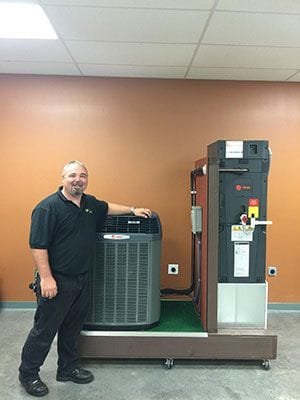You have been going back and forth about what career you want to pursue, but it has come down to the wire and you need to make a decision. You are going to buckle down to get trained and certified in HVAC – heating, ventilation and air conditioning – to begin your career as a certified technician who specializes in working on HVAC units.
The HVAC Service Training and subsequent certification, which takes nine months, is essential for working on heating and air conditioning units. While not all states require HVAC technicians to be certified prior to practice, it is strongly advisable, as some employers actively seek out industry-certified HVAC technicians. In addition, the U.S. Environmental Protection Agency (EPA) requires the certification for anyone who is going to execute service, repair, maintain and dispose of refrigerants that release chemicals into the air from inside of HVAC appliances.
What Type of Person Does it Take to Pursue HVAC Training and a Career in the Field?
 If you already have a desire to be in the field of heating and air conditioning repair and the drive to do what it takes to stick with a training program, then you probably already have the determination it takes to see it through. Here are a few other necessary characteristics:
If you already have a desire to be in the field of heating and air conditioning repair and the drive to do what it takes to stick with a training program, then you probably already have the determination it takes to see it through. Here are a few other necessary characteristics:
- You should have the ability to understand charts, technical drawings, diagrams and graphs.
- Having a mechanical inclination is great.
- Being hypervigilant regarding safety measures.
- Equipped to use instruments including electronic devices and output gauges, as well as hand and power tools.
- Possess troubleshooting skills and great customer service skills.
Now that you know you have what it takes to pursue this training, you want to get started as quickly as possible. Let’s go over what’s involved in the training and how long it will take. There are four types of HVAC technician certificates under the EPA Section 608 certification, which is for those who will be handling controlled refrigerant. Obtaining all four certifications isn’t necessary depending on the job you want to pursue, but they are required before you can begin professionally working on repair, maintenance, service and chemical disposal.
The certifications are types I, II, III and Universal; here are brief explanations on each them:
- Type I Certification is for technicians who will be primarily servicing small appliances including window air conditioner units, domestic refrigerators and vending machines.
- Technicians with Type II Certification are primarily responsible for servicing and disposing of equipment that has high pressure refrigeration like residential heat pumps and air conditioners, supermarket refrigeration and process refrigeration.
- Type III certified technicians have the primary job of servicing and disposing of equipment with low pressure refrigerant like that in chillers.
- For those who want to service all types of equipment, a Universal Certification is required.
The universal exam consists of 100 multiple choice questions and 25 each of Type I, Type II and Type III questions. You need a score of at least 72 percent in each section in order to pass the exam; that’s 18 correct answers out of 25 questions in each section. If you fail the sets of questions but pass the core question and at least one of the Type exams you will get a certification based on the type you passed.
You don’t have to worry about taking the test because you will have learned everything that is being asked by doing your hands-on training in our workshops as well as had the instruction of an esteemed HVAC professional.
What to Do After You Get HVAC Certification
With the experience and education you’ve obtained through training you are ready to work commercially and residentially, and we are excited to direct you with that as well. To assist you when it’s time to enter the workforce, we are available to support you with your job search. We offer career development and guidance, which is something that is a definite benefit to you. Also, depending on your preferences, you can work for a large corporation or a smaller company; even a mom and pop operation. Regardless of which path you take and the size of the company you pursue, you will be the expert on the job.
There are many options for someone who has completed HVAC School and achieved certification. In addition to the multiple career paths you can pursue within the industry, you will be earning a decent salary with outstanding benefits. For instance, a senior project manager earns more than $100,000 a year – and that’s a median salary for that position. With your education and experience under your belt, the doors leading to a career you have always wanted and dreamed of will be wide open.
